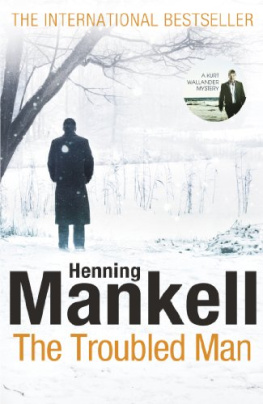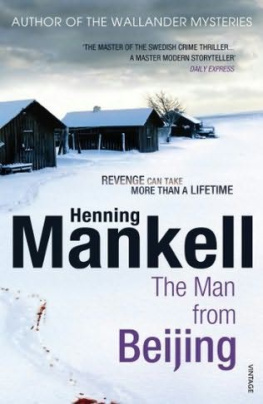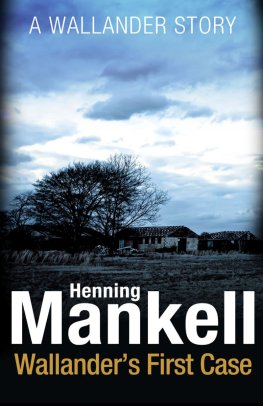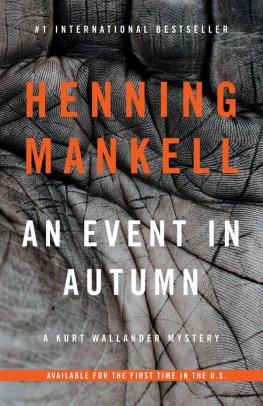ONE STEP BEHIND
Henning Mankell was born in Stockholm in 1948. He is the prize-winning author of the eight novels in the Inspector Wallander series which has been translated into many languages and consistently tops the best-seller lists throughout Europe. His novel Sidetracked won the CWA Gold Dagger in 2001. Mankell has worked as an actor, theatre director and manager in Sweden and in Mozambique, where he is head of Teatro Avenida in Maputo.
Ebba Segerberg teaches English at Washington University in St. Louis, Missouri.
BY HENNING MANKELL
Faceless Killers
The Dogs of Riga
The White Lioness
Sidetracked
The Fifth Woman
One Step Behind
The Dancing Master
Firewall
This eBook is copyright material and must not be copied, reproduced, transferred, distributed, leased, licensed or publicly performed or used in any way except as specifically permitted in writing by the publishers, as allowed under the terms and conditions under which it was purchased or as strictly permitted by applicable copyright law. Any unauthorised distribution or use of this text may be a direct infringement of the author's and publisher's rights and those responsible may be liable in law accordingly.
ISBN 9781407017631
Version 1.0
www.randomhouse.co.uk
Published by Vintage 2004
8 10 9
Copyright Henning Mankell 1997
English translation The New Press, 2000
Henning Mankell has asserted his right under the Copyright, Designs and Patents Act 1988 to be identified as the author of this work.
This electronic book is sold subject to the condition that it shall not by way of trade or otherwise, be lent, resold, hired out, or otherwise circulated without the publisher's prior consent in any form other than that in which it is published and without a similar condition including this condition being imposed on the subsequent purchaser
First published with the title Steget Efter by
Ordfronts Frlag Stockholm 1997
First published in Great Britain in 2002 by The Harvill Press
Vintage
Random House, 20 Vauxhall Bridge Road
London SWIA 2SA
Random House Australia (Pty) Limited
20 Alfred Street, Milsons Point, Sydney,
New South Wales 2061, Australia
Random House New Zealand Limited
18 Poland Road, Glenfield,
Auckland 10, New Zealand
Random House (Pty) Limited
Isle of Houghton, Corner of Boundary Road & Carse O'Gowrie,
Houghton 2198, South Africa
The Random House Group Limited Reg. No. 954009
www.randomhouse.co.uk/vintage
A CIP catalogue record for this book is available from the British Library
ISBN: 9781407017631
Version 1.0
There are always many more disordered than
ordered systems
FROM THE SECOND LAW OF
THERMODYNAMICS
The Overture to Rigoletto
GIUSEPPE VERDI
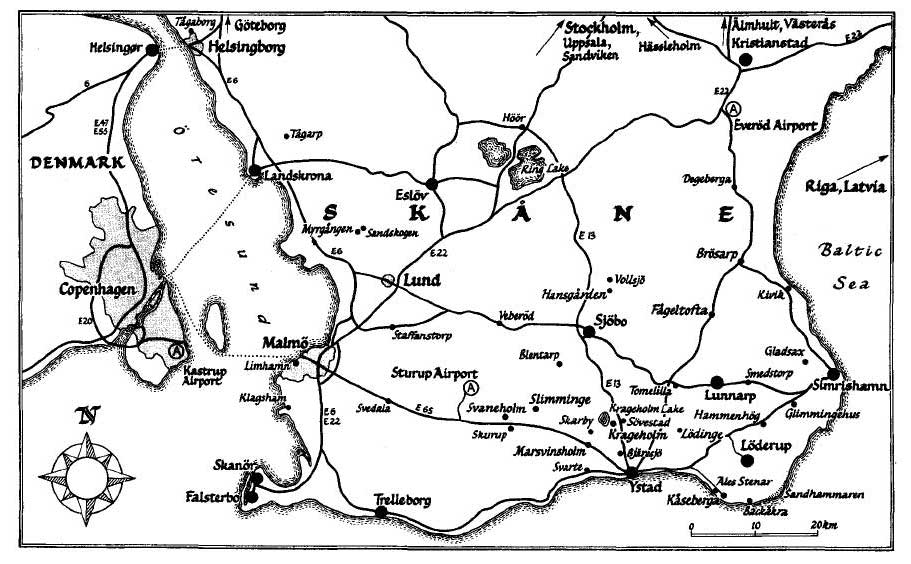
PROLOGUE
The rain stopped shortly after 5 p.m. The man crouching beside the thick tree trunk carefully removed his coat. The rain hadn't lasted for more than half an hour, and it hadn't been heavy, but damp had nonetheless seeped through his clothing. He felt a sudden flash of anger. He didn't want to catch a cold. Not now, not in the middle of summer.
He laid the raincoat on the ground and stood up. His legs were stiff. He started swaying back and forth gently to get his circulation going, at the same time looking around for any signs of movement. He knew that the people he was waiting for wouldn't arrive before 8 p.m. That was the plan. But there was a chance, however small, that someone else would come walking down one of the paths that snaked through the nature reserve. That was the only factor that lay beyond his control, the only thing he couldn't be sure of. Even so, he wasn't worried. It was Midsummer's Eve. There weren't any camping or picnic areas in the reserve, and the people had chosen the spot with care. They wanted to be alone.
They had decided on this place two weeks ago. At that point he had been following them closely for several months. He had even come to look at the spot after he learned of their decision. He had taken great pains not to let himself be seen as he wandered through the reserve. At one point an elderly couple came walking along one of the paths and he had hidden himself behind some trees until they passed.
Later, when he found the spot for their Midsummer festivities, he had immediately been struck by how ideal it was. It lay in a hollow with thick undergrowth all around. There were a few trees further up the hill. They couldn't have chosen a better spot not for their purposes, nor his own.
The rain clouds were dispersing. The sun came out and it immediately became warmer. It had been a chilly June. Everyone had complained about the early summer in Skne, and he had agreed. He always did. It's the only way to sidestep life's obstacles, he thought, to escape whatever crosses one's path. He had learned the art of agreeing.
He looked up at the sky. There would be no more rain. The spring and early summer had really been quite cold. But now, as evening approached on Midsummer's Eve, the sun came out at last. It will be a beautiful evening, he thought. As well as memorable.
The air smelt of wet grass. He heard the sound of flapping wings somewhere. To the left below the hill was a glimpse of the sea. He stood with his legs apart and spat out the wad of chewing tobacco that had started to dissolve in his mouth, then stamped it into the sand. He never left a single trace. He often thought that he should stop using tobacco. It was a bad habit, something that didn't suit him.
They had decided to meet in Hammar. That was the best place, since two of them were coming from Simrishamn and the others from Ystad. They would drive out to the nature reserve, park their cars, and walk to the spot they had chosen. They had not been able to agree upon anything for a long time. They had discussed various alternatives and sent the proposals back and forth. But when one of them finally suggested this place, the others had quickly assented, perhaps because they had run out of time. One of them took care of the food, while another went to Copenhagen and rented the clothes and wigs that were needed. Nothing would be left to chance. They even took the possibility of bad weather into account. At 2 p.m. on Midsummer's Eve, one of them put a big tarpaulin in his red duffel bag. He also included a roll of tape and some old aluminium tent pegs. If it rained, they would have shelter.
Everything was ready. There was only one thing that could not have been anticipated. One of them suddenly became ill. It was a young woman, the one who had perhaps been looking forward to the Midsummer's Eve plans most of all. She had met the others less than a year before. When she woke up that morning she had felt nauseated. At first she thought it was because she was nervous. But some hours later, when it was already midday, she had started vomiting and running a temperature. She still hoped it would pass. But when her lift arrived, she stood at the door on trembling legs and said that she was too ill to go.
Consequently, there were only three of them in Hammar shortly before 7.30 p.m on Midsummer's Eve. But they did not allow this to spoil the mood. They were experienced; they knew that these things happened. One could never guard against sudden illness.
They parked outside the nature reserve, took their baskets, and disappeared down one of the paths. One of them thought he heard an accordion in the distance. But otherwise there were just birds and the distant sound of the sea.
When they arrived at the selected spot they knew at once that it had been the right choice. Here they would be undisturbed and free to await the dawn.



